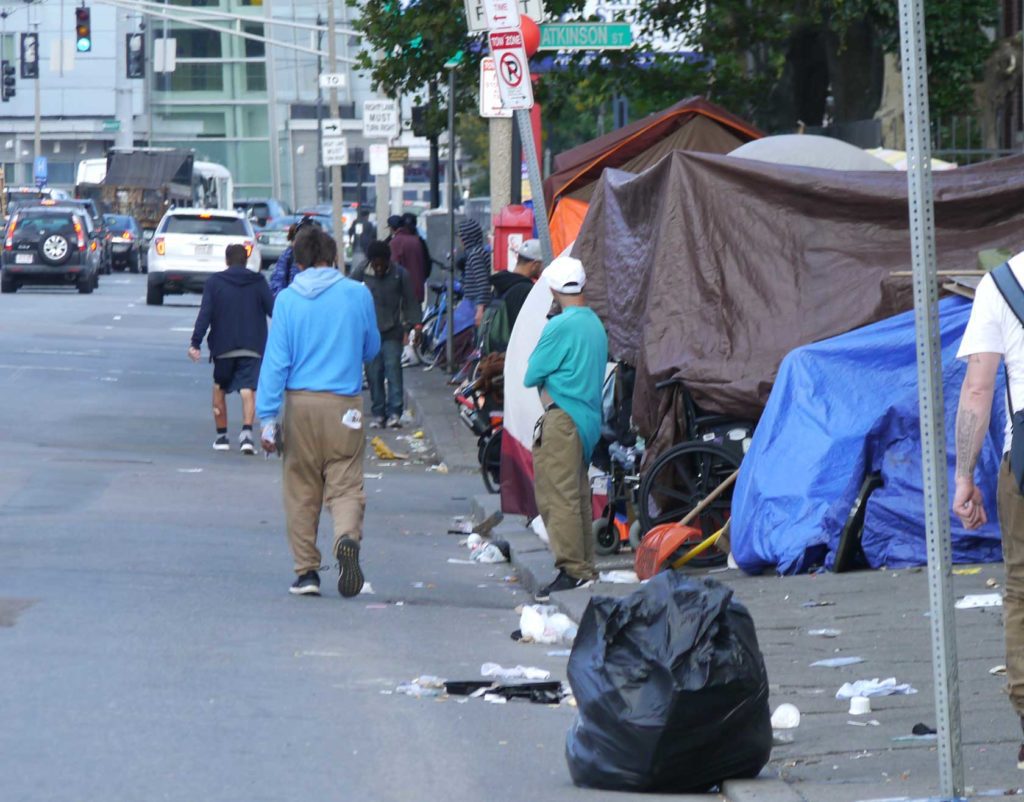
With the ongoing opioid crisis continuing to take its toll on the area surrounding Massachusetts Avenue and Melnea Cass Boulevard, community activists are asking for solutions outside of the city of Boston.
“It’s not up to the city anymore. It’s out of their control,” said Domingos DaRosa, a youth football coach in the neighborhood, where he also grew up.
DaRosa has been a leading voice in the fight for accountability and solutions from lawmakers. He made headlines over the last year after his Pop Warner team was forced to move and join a team in Jamaica Plain because of the constant presence of discarded needles on the Clifton Park field where they practiced. He’s now part of the South End-Roxbury Community Partnership group, which rallies for government intervention to stop health and public safety issues posed by the conditions in the Mass and Cass encampments.
DaRosa said that even in light of acting Mayor Kim Janey’s tent removal order, things have not drastically improved.
“They can clean up one area, and they’ll move to the next area,” he said.
Janey’s policy, which she said successfully connected nearly 70 people with shelter and/or treatment in its first week, came at the end of her eight-month stint as the city’s leader. During her tenure, widespread concern spread over the sheer volume of tents set up in the South End area, with more than 200 tents lining the streets at one point over the summer.
Lorraine Payne Wheeler, president of the Roxbury Path Forward Neighborhood Association, echoed DaRosa’s sentiment that those who were once sleeping at “Mass and Cass” have now pushed into Nubian Square and other parts of Roxbury.
“When the city does more in the area around Mass and Cass, you see that those individuals sort of migrate into the rest of the community,” Payne Wheeler said.
According to both Payne Wheeler and DaRosa, part of the exacerbation of the problem has been the concentration of addiction services in the area, attracting people from areas across the state without their own regional services.
“You have individuals who come down to receive treatment, methadone or suboxone, and when they come, they bump into friends. They see what’s going on, folks coming out of prison, coming out of South Bay House of Correction,” said DaRosa. “If I was in jail for a year for drug-related charges and the first thing I see is what’s there now, I’m going to relapse.”
As for possible solutions, both Payne Wheeler and DaRosa are calling on state government to decentralize the addiction recovery services as a way to lessen the concentration of those struggling. Decentralization was also a key platform issue for several of the mayoral candidates in the recently concluded race, including former District 4 councilor Andrea Campbell and candidate Annissa Essaibi George, who lost to opponent Michelle Wu in the final election earlier this month.
Wu, who has appointed former Department of Public Health Dr. Monica Bharel as her Mass and Cass czar and promoted Boston Health Commission executive director Dr. Bisola Ojikutu to a cabinet-level position, said during her campaign that she supports investing in regional recovery, “including advocating for a new recovery campus, such as at the Arborway Yards or another publicly-owned parcel,” as stated on her campaign website. It continues, “Leveraging Boston’s immense healthcare resources requires proactive and transparent collaboration with regional and state partners to expand access to treatment.”
The Wu team declined to comment for this story.
Ultimately, though, creating new programming and new addiction recovery centers would come down to a decision by the state. There’s hope that discussion over the last month between city officials and Gov. Charlie Baker, which has so far yielded a recent decision regarding temporary shelters to be set up at the Shattuck Hospital, will also lead to robust change across the commonwealth.
In a statement to WCVB Channel 5, the Governor’s press office said, “The Baker-Polito administration has been engaging with the city of Boston and other stakeholders on how to support the city’s efforts to address the Mass. & Cass crisis. The administration supports a regional approach and is making several resources available, including treatment beds, supportive housing units, and financial support.”
Other efforts by the Baker administration to curb opioid addiction statewide include a seven-day limit on first prescriptions of opioids, a mandatory prescription-monitoring program for physicians and a mandate that all public schools provide information to parents whose children participate in athletic programs regarding the potential dangers of opioid misuse.
Any plans for further action are unclear.
As for other solutions to the problems around Mass and Cass, especially in the short-term as the temperature drops, DaRosa and Payne Wheeler are divided. DaRosa said he supports creating some sort of temporary structure in the area to protect people from the elements.
“If they want to live in a tent, which is their right, their freedom of choice, give them a space where they can do that,” he said. “Open up some of these parking lots that are not being used and give them the area to be able to and put something in place.”
Payne Wheeler said she supports the plan proposed by Suffolk County Sheriff Steven Tompkins to house people in empty parts of the adjacent South Bay House of Correction.
“He’s got a building that’s right in the location where people are. And I think that there’s only a short window of time before it gets very cold in Boston,” she said.






